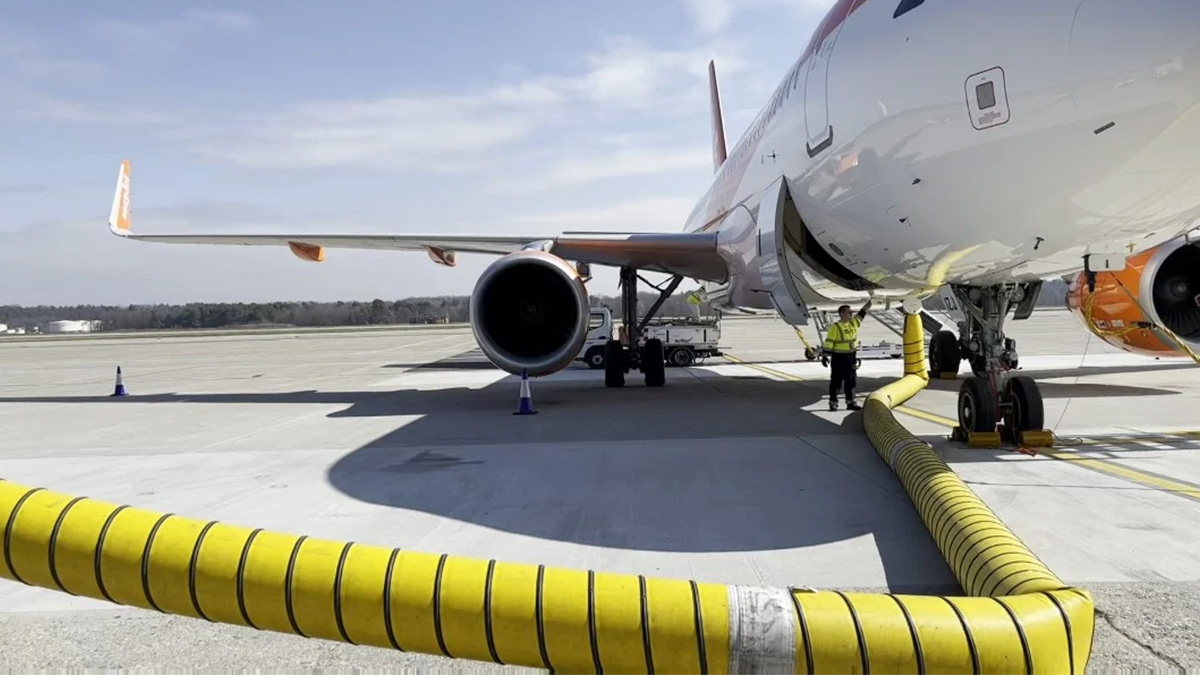easyJet targets reductions in fuel, carbon emissions and noise following
- 3/13/2025
- 353 Day

easyJet is set to permanently roll out of
Project APU-ZERO at its Milan Malpensa base following a successful trial at the
northern Italian base.
The proof of concept, tested in September 2024, allows
easyJet aircraft to switch off its Auxiliary Power Units - a gas turbine
located at the tail of the plane.
The APU, one of many essential and intricate parts of
a plane not only provides electric power and air conditioning to the aircraft
during the turnaround process but also helps to start the engines when the
aircraft is taxiing and preparing for take off.
However, when stationary during turnaround, APUs use a
considerable amount of fuel which contributes to both noise and carbon
emissions on the apron.
To solve this challenge and create a clean and quieter
environment on the ground for both staff and passengers - easyJet and its
partners TCR, PCA manufacturer Guinault and ground-handling partner Menzies,
with the full cooperation of SEA Milan Airports, traded in the APU for electric
and hybrid Pre-Conditioning Air Units.
PCAs, a mobile Ground Support Equipment solution
connects to the airport’s Fixed Electrical Ground Power (FEGP) via the gate, instantly
cutting down the noise and fuel burn that came with its predecessor while
simultaneously providing filtered and conditioned air to passengers and crew
during the boarding and deboarding process.
Following the trial on 57 aircraft operating out of and
into Milan Malpensa’s Terminal 2, which is fully operated by easyJet, the
airline saw a reduction in fuel use and carbon emissions. The airline estimates
it’ll make an annual fuel saving of 1,115 tonnes – equivalent to 3,636 tonnes
of Co2.
Speaking on the initiative, Lahiru Ranasinghe,
Director of Sustainability at easyJet, said: “At easyJet we take a holistic
approach to reducing our impact in the air and on the ground. This trial, part
of our operational efficiencies workstream, resulted in fuel and emissions
savings and a reduction in noise, without affecting our operation. This is yet
another small but important step that contributes to our broader
decarbonisation journey and is an excellent example of an initiative that
provides both environmental and business benefits.”
“Following this successful proof of concept with our
partners TCR, Guinault and Menzies we hope to replicate this model and deploy
this initiative to many other bases that we operate in across our network.”
Katy Reid, Head of Sustainability & Corporate
Responsibility, at Menzies Aviation added: “It’s fantastic to see this
permanent switch to electric-powered Pre-Conditioning Air Units at Milan
Malpensa Airport. AGS, Menzies Aviation’s partner at Milan Malpensa, has done
us proud once again for adapting to new processes and equipment to deliver
seamless operations for easyJet on the ground.
“This also highlights the strength of collaboration
between airlines, airports and aviation services to reduce emissions from
ground operations during aircraft turns and what can be achieved when partners
support each other on their journey to meeting our aligned sustainability
goals. The AGS and Menzies electric first approach has resulted in 81% of our
motorised GSE fleet being electric at Malpensa Airport."
Kristof Philips, CEO of Airport Solutions at TCR,
said: “The Collaboration between key stakeholders – Airbus, Guinault, easyJet
and Menzies has enabled us to develop an integrated solution for actively
managing APU usage on the ground.
“Witnessing the substantial reduction in APU runtime
not only highlights carbon footprint reductions achieved but also considerable
cost savings while supporting our customers in their sustainability
journey."
In total, easyJet will be deploying 16 PCA units at
Milan Malpensa with six units being added this month and another six in April,
while the four remaining units will be added in May.
Since launching its roadmap to decarbonise its
operations in 2022, easyJet continues to invest in several operational
efficiencies to help lower its impact in both the air and the ground. Just
recently easyJet achieved its best-ever per-passenger carbon intensity for 2024
– a 5.6% improvement versus the Net Zero baseline of 2019.








